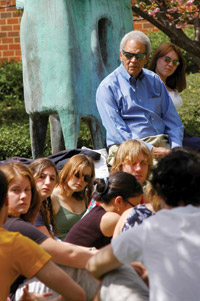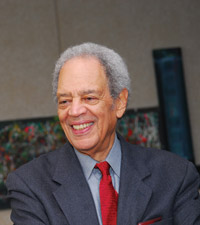Professors We Love: Roger Wilkins
 Of the many exciting experiences I’ve had in my four years at Mason, the teaching of Roger Wilkins, Robinson Professor of History and American Culture, has been one of the best. Just his presence at the university motivated me to apply to Mason.
Of the many exciting experiences I’ve had in my four years at Mason, the teaching of Roger Wilkins, Robinson Professor of History and American Culture, has been one of the best. Just his presence at the university motivated me to apply to Mason.
I had read his accolades and of his tireless work for civil rights and knew of his credentials as a Pulitzer Prize–winning journalist. I felt he could teach me something valuable for my career in communication. I wasn’t disappointed; the lessons
I learned from him have grown into tools I can use to succeed beyond journalism, in life itself.
I took the University 190 seminar with Wilkins my first semester at Mason and quickly discovered his compassion, dignity, and strong sense of responsibility to his students. His schedule was busy, but he still made time to help his students with writing and ideas, or just chat about their interests and desires. He loved talking in vivid detail about his childhood experiences. One such story inspires me daily.
 He spoke of when he was a young boy living around Detroit during the Great Depression. He was watching two middle-aged white men work on a broken drain near his house. One of the men looked up to wipe his brow and saw Wilkins standing next to them. The man said hello, and Wilkins responded by introducing himself. He then asked the man for his name. The man drew his eyebrows low, looked Wilkins in the eye, and said, “Son, I’m too poor to have a name.” This story drove home for me the need for compassion and caring and how the color of our skin should not affect our desire to help one another.
He spoke of when he was a young boy living around Detroit during the Great Depression. He was watching two middle-aged white men work on a broken drain near his house. One of the men looked up to wipe his brow and saw Wilkins standing next to them. The man said hello, and Wilkins responded by introducing himself. He then asked the man for his name. The man drew his eyebrows low, looked Wilkins in the eye, and said, “Son, I’m too poor to have a name.” This story drove home for me the need for compassion and caring and how the color of our skin should not affect our desire to help one another.
Wilkins knows political issues should not divide us and that any college or university should be a marketplace of ideas. He once spoke of an incident on campus where one fraternity received an activities ban after an incident that sparked racial tension. He felt the need to turn the situation into a teaching experience to underscore the need for cooperation and the patience to make a difference on both sides of the issue within the political realm instead of through hatred.
Through Wilkins’s service, Mason has gained so much in the programs he has established, the activities he has supported, and the individuals with whom he has come in contact. Students who have taken his classes or spoken with him at length embark on their lives more enlightened and understanding of others because of him.
Wilkins will retire from the university next summer. With his departure, Mason loses not only a professor, but a man with an enormous heart and the willingness to make the university as distinguished an academic institution as possible. He is irreplaceable.
—Anthony Budny, BA Communication ’07
Do you fondly remember certain places within the Mason community that exemplified the “college experience”? Were you befriended by a mentor or professor at Mason who influenced your life? If so, tell us about it. Send your submission to Alumni Affairs, George Mason University, 4400 University Drive, MS 3B3, Fairfax, VA 22030. Please keep submissions to a maximum of 500 words.

